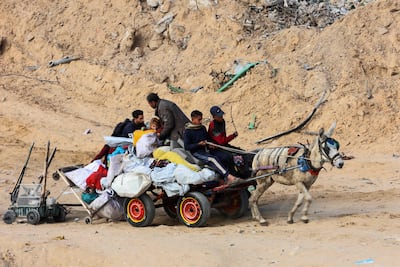Live updates: Follow the latest on Israel-Gaza
Relatives of those killed in Gaza have started to search for the remains of their loved ones beneath the rubble of the enclave to give them a proper burial.
Until the ceasefire between Israel and Hamas came into effect, Israeli eviction orders applied to 80 per cent of the enclave, the UN's Office for the Co-ordination of Humanitarian Affairs estimated. Notified through social media and leaflet drops, Gazans fled their homes and other areas several times, leaving behind those who refused to, or were unable to, leave and the remains of those killed.
In the Rafah governorate, at least 137 bodies have been recovered from the streets and rubble since the ceasefire began on Sunday, with countless more still missing. In northern Gaza, dozens of bodies were retrieved from the streets in the first days of the truce.
“We are making strenuous efforts to collect the bodies and re-bury the martyrs in designated cemeteries,” Mahmoud Basal, a spokesman for Gaza's civil defence, told The National. “But we face enormous challenges – a severe lack of resources, limited tools for searching and removing debris, and a critical shortage of equipment to reach the bodies.”

OCHA estimates that the enclave has more than 42 million tonnes of rubble to clear. The operation is complicated not only by lack of appropriate equipment such as diggers, but also unexploded ordnance.
“We face a daunting task of searching for the bodies of over 10,000 martyrs buried under the rubble of homes,” Mr Basal said. The bodies of about 2,840 people had disintegrated due to the types of weaponry used during the conflict, he added.
As aid agencies focus on food assistance, families have resorted to digging with their bare hands, trying to recover the bodies of loved ones.
In the Tel Al Sultan neighbourhood of Rafah, Sobhi Ziyad, 53, has been searching for his three children, who were last seen near the municipality. “Since the truce began, we’ve been running to search for them, but the entire area has turned into piles of rubble and ash. We can’t locate them, despite many people trying to help,” Mr Ziyad said.
“We asked the civil defence and ambulance teams for assistance, but they’re overwhelmed and lack the resources for extensive searches. Right now, they can only retrieve visible bodies.
“The dignity of the dead is in their burial, and I just want to bury my three sons – Imad, Saeed and Ramzi – like everyone else. I want them to have a grave I can visit. If that doesn’t happen, it will remain a heartbreak for me for the rest of my life.”
Othman Al Bayk, 42, is still searching for the bodies of his brother Ibrahim and nephews Fadi and Mohammed, who were killed in a strike on Beit Lahia. “My brother refused to leave his home, despite the dangers. He stayed with his two sons,” Mr Al Bayk said.
“Our only wish is to find their bodies so we can honour them with a proper burial. If they remain missing, it will be a sorrow that stays in our hearts for ever.”
Discovering the true scale of north Gaza's destruction

Returning to northern Gaza, an area that was under siege for months by Israeli forces, has been an especially harrowing experience for many. In December, residents in the area told The National that bodies of people shot by Israel's military or killed in strikes were being eaten by stray dogs, because it was too dangerous to retrieve the remains.
“The streets were littered with decomposed bodies and dogs had ravaged most of them,” Mr Al Bayk said. "It’s incredibly painful to see the dignity of the dead violated like this."
The clear-up of dangerous materials left over from the bombardment, which has killed about 47,000 people since the start of the conflict in October 2023, could take 21 years and cost up to $1.2 billion, a UN damage assessment found. Given the initial ceasefire period is six weeks before steps towards a more permanent peace are taken, Gazan families are moving quickly to try to recover what is left of their relatives.
For Ayman Al Souri, 48, from Jabalia refugee camp, the truce brought an opportunity to search for his son, Mahmoud, 24. “He was trapped in northern Gaza during the invasion,” Mr Al Souri told The National. "He and some other young men tried to escape through Al Faluja Cemetery, but the army targeted them.
"Mahmoud was injured, and while two young men managed to escape, they told us he had been left behind, wounded. We were certain he had been martyred.
“As soon as the truce began, I rushed with my remaining sons to the area. We found the site bulldozed and tried to locate where the rubble had been moved. After searching through a pile of debris nearby, we were certain it came from Mahmoud’s location.”
The family spent the first day of the ceasefire digging through the rubble without success. The next day, they found his clothes and later his remains.
“We gathered his remains, took him to the hospital to register him as a martyr, and then buried him in Beit Lahia Cemetery,” Mr Al Souri said. “My heart finally found some peace after I was able to bury my son and honour him. His martyrdom is difficult to bear, but it would have been even harder if he had been left without a grave.”


